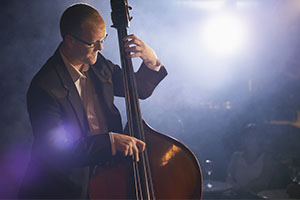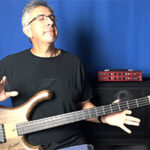As a bass player, holding your arm up for 50 years can eventually catch up to you
By Jon Liebman
July 1, 2022
I’ve been hearing from a lot of bass players lately who are facing arthritis, tendonitis, and other physical challenges, making bass playing difficult and often painful.
As we get older, something’s bound to happen sooner or later to make things harder. Personally, I’ve been dealing with arthritis, back issues, and some other stuff for years, so I know how difficult it can be. The good news is, there are things you can try that can make playing bass less painful and more fun.
I had a very enjoyable and informative conversation with Avery Sharpe recently. Avery played bass with McCoy Tyner for some 20 years, in addition to stints with Art Blakey, Archie Shepp, Dizzy Gillespie, Wynton Marsalis, and Yusef Lateef. Best known as an upright player, Avery knows a thing or two about ailments that seem to come out of nowhere, often making it difficult just getting from day to day.
We’re not machines
“We’re not machines,” Avery says, “and of course, there are things that start to break down as we get older, no matter what we do.”
Of course that goes for musicians and non-musicians alike.
“We all have challenges just walking around the planet,” he says, “but when you add an instrument to that, how do you deal with that?”
Having done countless gigs, on both electric and upright bass, I could totally relate to what Avery was talking about.
Where does it hurt?
“I do have back issues as well,” he says, “from 50 years of having my arm up, and bopping my head. I have a problem with my occipital area, so I’m learning how to modify my playing.” Specifically, he mentioned doing less bending over the bass, trying to stand up straighter, and using a longer endpin as examples.
“There’s different exercises I’ve done over the years,” Avery says. “I lift weights, I run, bike… There’s exercises I do to help my wrists, different finger exercises I do. I’m still basically a jock. Old jock, but basically still there!”
Could pain management be for you?
Of the people reaching out to me to learn bass, a growing number of them mention arthritis, specifically, along with neck pain, shoulder pain, and other aches. Some are dealing with the aftermath of an accident as well.
“People have arthritis and different things,” Avery says, “so you just have to do what they call pain management, and that can be physical therapy.”
Whatever you do, be careful. Sometimes there’s a tendency to want to play through the pain, which is not always advisable. Though it mostly comes down to just doing what makes sense, it’s not a bad idea to consult a therapist or a medical professional.
Know your body
“There’s a difference between (just) pain,” says Avery, “and pain where it’s causing you injury. I can’t tell a person where that point is. You have to know your body to know this is damaging, what it is that I’m doing, or it’s just some pain that I have to get through.”
Nobody’s body was designed to play an instrument, especially a bass. We need to take care of ourselves. Playing bass, after all, isn’t supposed to hurt; it’s supposed to be fun!
What about you? Have things like arthritis, a movement disorder, or other physical challenges gotten in the way of your bass playing? Leave a comment below and let me know how you’re dealing with whatever your situation is. In the meantime, watch my interview with Avery here.
None of my content or messaging should be construed as medical advice. My focus is on teaching proper bass technique, minimizing pain and discomfort, and sharing ideas that have helped students find joy and fulfillment in playing music. If you feel you need to consult your doctor, don’t hesitate to do so. I want you to stay healthy!






Thanks so much for helping us be more aware. (easy does it)
Thanks for the thanks, Ted! One day at a time…
After dealing with wrist issues and several cortisone shots and the Doc wanting to do surgery with a 4 week recuperating time, I decided to try something myself. I raised my strap to the next hole on the rear pin (about 4-5 inches) and bam…..no more pain…..something so simple as the angle of my left hand on the neck….
Amazing! Thanks, Joey. Did you tell your doctor??